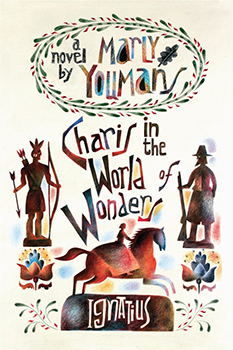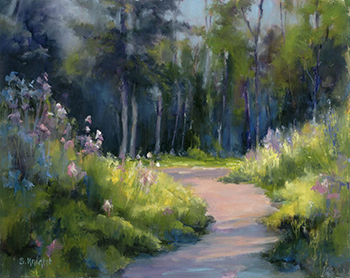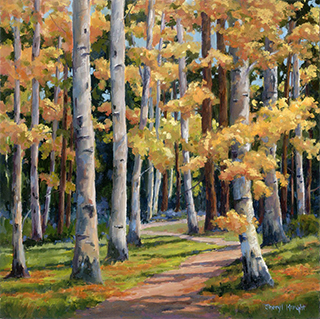Michael Fitzpatrick is a parishioner at St. Mark's Episcopal Church in Palo Alto, CA. After growing up in the rural northwest, he served over five years in the U. S. Army as a Chaplain's Assistant, including two deployments to Iraq. After completing his military service, Michael has done graduate work in literature and philosophy. He is now finishing his PhD at Stanford University.
This 8D essay is dedicated to Tiffany, in thanks for the past few years of exceptional ecumenical dialogue between a Roman Catholic and an Anglican.
Poet and novelist Marly Youmans’ latest novel is a treasure. You may know her for her dazzling ability to channel lush lyrics that can feel utterly authentic to the intended epoch (especially her epic poem Thaliad). Her prose extends her gifts of language; Charis and the World of Wonders feels as if someone found a 17th-century diary and transcribed it. Youmans’ book is a gem of cultural curiosity, an Anglican-turned-Orthodox author attempting to explore Puritan New England in 1690 through the eyes of Charis, a remarkable young lady with a fertile imagination, sumptuous narrative voice, and an authentic faith lived out in a harsh world. This is where Youmans’ novel is its strongest: presenting a life of faith not as an add-on to an otherwise secular existence, but as the entire horizon and interpretive lens through which Charis understands the events that happen to her and how she should navigate through them.
 |
|
Marly Youman's novel Charis in the World of Wonders. |
The novel begins in medias res, with Charis being pushed out a back window by her mother as her parents and relatives fight an onslaught of native peoples and French instigators. You might fear this sets the reader up for a long slog through jingoism, but you’d be mistaken. Charis lives up to her name; she constantly astonishes with her ability to combine a pragmatic realism with a tender universal spirit. She does not react with anger when she stumbles upon a fallen native man who had been part of the war party; instead, she realizes how similar he is to the men from her own community.
Unfortunately, her family does not survive the night, and thus begins Charis’ adventures across Massachusetts in search of a life and identity now that her entire familial context has been erased. She does so from the rich inheritance her family has left her — not wealth or land (though some consider her bloodline to be of “good stock”), but a soul that sees the world in textured spiritual categories. She regularly quotes from the scriptures, acknowledging that, “Without those words, my soul would have spiraled up toward the sun and jumped through that bright door and been glad to go from the world and not return, burned clean of sin and ill memory.” Just as the scripture renews her soul, so Charis finds her environment, whether forest or urban, alive with revelation:
The world was crammed with signs and messages, if only we had the wit and discernment to see, mark, and read. Wisdom revealed a voice murmuring in the leaves, cursive in the running streams, and sermons compacted in the bright veins of stones.
 |
|
Enchanted painting by Sheryl Knight, a family member. |
As Charis navigates her tumultuous place in pre-American history, I was struck at the resonance between her tale and that of the Ukrainians right now battling for their lives and country against Russian incursion into their land. People want a place to live in peace, away from threat and danger. Charis’ family sought this on the frontier, but it was a vain hope as New England continued to be exploited by both English and European colonial ambitions. After discovering one of her family’s horses, Hortus, she whispers to him, “My flower, my black-shining sun, my sweet garden of silk, let us gallop away. We can find out some paradise with a wall around it, one where no arrows and spears can pierce the air, and where the orchard trees are ever in lusty fruit and bloom, and the springs jet forth as crystal fountains.” Do not the peoples of Ukraine hope for such a paradise, one where no tank can rumble the streets or fighter jet can pierce the air? Do not all people?
Charis’ yearning is deeply biblical, rooted in the long history of the Israelite and Jewish peoples’ quest to secure a promised land for themselves, and later to hope for a new heavens and a new earth. Both are places where
No longer will they build houses and others live in them,
or plant and others eat.
For as the days of a tree,
so will be the days of my people;
my chosen ones will long enjoy
the work of their hands.
They will not labor without reward,
nor will they bear children doomed to misfortune;
for they will be a people blessed by the Lord,
they and their descendants with them.
Before they call I will answer;
while they are still speaking I will hear.
The wolf and the lamb will feed together,
and the lion will eat straw like the ox,
and dust will be the serpent’s food.
They will neither harm nor destroy
on all my holy mountain,
says the Lord.
- Isaiah 65.22-25
This vision includes all peoples, not merely one’s own tribe. Charis is alone, stricken, and deprived not only of family and shelter but of anyone to whom she can easily turn for shelter and belonging. So she cannot help but pine with her newfound equine friend for that biblical vision of rest and security where
Everyone will sit under their own vine
and under their own fig tree,
and no one will make them afraid,
for the Lord Almighty has spoken.
- Micah 4.4
Charis is the Greek word for ‘grace,’ and in due time Charis discovers grace for herself. The Saltonstalls, a kindly couple in a village many days away from where Charis’ family was attacked, take her in and give her fresh clothes and provide her board. They even have the local village take up a financial offering to restore to her some measure of autonomy and security. Charis struggles mightily to accept these gifts: “Almost, it seemed a betrayal of my sufferings. At times, I felt a sudden need to be solitary and think on what had happened, to fling all my grief upward in a single, silent word: to resolve my mind in favor of goodness and in favor of life before I returned to the others.” As I read, I found myself wondering whether her deep saturation in her faith made it easier or more difficult to accept God’s grace when it appears during our moments of profound need.
 |
|
Aspen Hollow painting by Sheryl Knight, a family member.
|
There are so many wonders in this novel — from references to Anne Bradstreet’s poetry to the deliciously archaic diction, and, most notably, Charis’ irrepressible spirit. Like Marilynne Robinson’s Gilead, Marly Youmans’ latest novel does not shy away from weightier themes, including the struggle of finding God’s love in a world of unchecked evil and pride.
But perhaps the most timely aspect of this novel is its foreignness. Every page assumes a background and manifests a foreground in utter contrast to the post-nuclear, post-computer age we take for granted. For example, when Charis designs to take on temporary employment as a seamstress in a nearby town to start earning her way, her kindly hosts refer to her family name and say, “Your mother would be grieved to think that you were in such a post. You are no servant to labor for wages.” The idea that some people are above wage labor is almost hard to imagine in our capitalist society. Moreover, as Charis bravely steps into life as “a working woman,” she does so on the assumption that behind every gesture, or sewing needle, or flickering candle flame, are spirits at work for good or ill. So much of our society today perceives a world of dead clay ready for the potter’s wheel. Perhaps what we all need is to spend some time in the world of wonders, to see the spiritual life of each stone and leaf and insect and mammal and human artifact as Charis does.
Marly Youmans has written a luxurious novel full of maturity and honest faith, one that rejects the tired defensiveness of so much contemporary Western Christian literature in favor of a story that simply shows a faithful person in an uncertain world, and lets the reader find God there.
Michael Fitzpatrick welcomes comments and questions via m.c.fitzpatrick@outlook.com
Image credits: (1) Lafayette College; (2) Sheryl Knight Artist; and (3) Pinimg.com.



